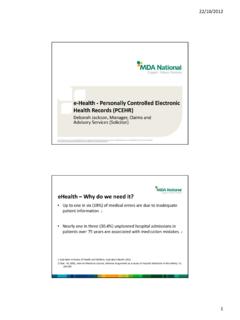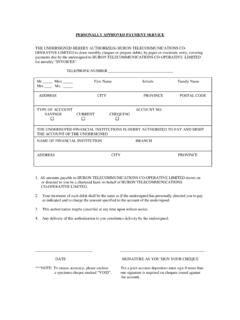Transcription of Are you personally liable for your company …
1 Are you personally liable for your company 's employment tax Employers are required by the Internal Revenue Code to calculate, withhold, and deposit with the IRS all federal employment taxes related to wages paid to employees. Failure to comply with these requirements can find certain "responsible persons" held personally liable . Who is a responsible person for purposes of employment tax obligations? The broad interpretation defined by the courts and the IRS may surprise you. Employer's responsibility regarding employment taxes Employment taxes such as federal income tax, social security (FICA) tax, unemployment (FUTA) tax and various state taxes (note that state issues are not addressed in this article) are all required to be withheld from an employee's wages. Wages are defined in the Code and the accompanying IRS regulations as all remuneration for services performed by an employee for an employer, including the value of remuneration, such as benefits, paid in any form other than cash.
2 The employer is responsible for depositing withheld taxes (along with related employer taxes) with the IRS in a timely manner. 100% penalty for non-compliance Although the employer entity is required by law to withhold and pay over employment taxes, the penalty provisions of the Code are enforceable against any responsible person who willfully fails to withhold, account for, or pay over withholding tax to the government. The trust fund recovery penalty -- equal to 100% of the tax not withheld and/or paid over -- is a collection device that is normally assessed only if the tax can't be collected from the employer entity itself. Once assessed, however, this steep penalty becomes a personal liability of the responsible person(s) that can wreak havoc on their personal financial situation -- even personal bankruptcy is not an "out" as this penalty is not dischargeable in bankruptcy.
3 A corporation, partnership, limited liability or other form of doing business won t insulate a "responsible person" from this obligation. But who is a responsible person for purposes of withholding and paying over employment taxes, and ultimately the possible resulting penalty for noncompliance? Also, what constitutes "willful failure to pay and/or withhold"? To give you a better understanding of your potential liability as an employer or employee, these questions are addressed below. Who are "responsible persons"? Typically, the types of individuals who are deemed "responsible persons" for purposes of the employment tax withholding and payment are corporate officers or employees whose job description includes managing and paying employment taxes on behalf of the employer entity.
4 However, the type of responsibility targeted by the Code and regulations includes familiarity with and/or control over functions that are involved in the collection and deposit of employment taxes. Unfortunately for potential targets, Internal Revenue Code Section 6672 doesn't define the term, and the courts and the IRS have not formulated a specific rule that can be applied to determine who is or is not a "responsible person." Recent cases have found the courts ruling both ways, with the IRS generally applying a broad, comprehensive standard. A Texas district court, for example, looked at the duties performed by an executive -- and rejected her argument that responsibility should only be assigned to the person with the greatest control over the taxes. Responsibility was not limited to the person with the most authority -- it could be assigned to any number of people so long as they all had sufficient knowledge and capability.
5 The Fifth Circuit Court of Appeals has delineated six nonexclusive factors to determine responsibility for purposes of the penalty: whether the person: (1) is an officer or member of the board of directors; (2) owns a substantial amount of stock in the company ; (3) manages the day-to-day operations of the business; (4) has the authority to hire or fire employees; (5) makes decisions as to the disbursement of funds and payment of creditors; and (6) possesses the authority to sign company checks. No one factor is dispositive, according to the court, but it is clear that the court looks to the individual's authority; what he or she could do, not what he or she actually did -- or knew. The Ninth Circuit recently cited similar factors, holding that whether an individual had knowledge that the taxes were unpaid was irrelevant; instead, said the court, responsibility is a matter of status, duty, and authority, not knowledge.
6 Agreeing with the Texas district court, above, the court held that the penalty provision of Code section 6672 doesn't confine liability for unpaid taxes to the single officer with the greatest control or authority over corporate affairs. Suffice it to say that, under the various courts' interpretations -- or that of the IRS -- many corporate managers and officers who are neither assigned nor assume any actual responsibility for the regular withholding, collection or deposit of federal employment taxes would be surprised to find that they could be responsible for taxes that should have been paid over by the employer entity but weren't. What constitutes "willful failure" to comply? Once it has been established that an individual qualifies as a responsible person, he must also be found to have acted willfully in failing to withhold and pay the taxes.
7 Although it may be easier to establish the ingredients for "responsibility," some courts have focused on the requirement that the individual's failure be willful, relying on various means to divine his or her intent. An Arizona district court, for example, found that a retired company owner who had turned over the operation of his business to his children while maintaining only consultant status was indeed a responsible person -- but concluded that his past actions indicated that he did not willfully cause the nonpayment of the company 's employment taxes. Since he had loaned money to the company in the past when necessary, his inaction with respect to the taxes suggested that he believed the company was meeting its obligations and the taxes were being paid. A Texas district court found willfulness where an officer of a bankrupt company knew that the taxes were due but paid other creditors instead.
8 The Fifth Circuit has determined that the willfulness inquiry is the critical factor in most penalty cases, and that it requires only a voluntary, conscious, and intentional act, not a bad motive or evil intent. "A responsible person acts willfully if [s]he knows the taxes are due but uses corporate funds to pay other creditors, or if [s]he recklessly disregards the risk that the taxes may not be remitted to the government, or if, learning of the underpayment of taxes fails to use later-acquired available funds to pay the obligation. Planning ahead Is there any way for those with access to the inner workings of an employer's finances or tax responsibilities -- but without actual responsibility or knowledge of employment tax matters -- to protect themselves from the "responsible person" penalty?
9 It may depend on which jurisdiction you're in -- although a survey of the courts suggests most are more willing than not to find liability. Otherwise, the wisest course may be to enter into an employment contract that carefully delineates and separates the duties and responsibilities -- and the expected scope of knowledge -- of an individual who might find himself with the dubious distinction of being responsible for a distinctly unexpected and undesirable drain on his finances. The laws and requirements related to employment taxes can be complex and confusing with steep penalties for non-compliance. For additional assistance with your employment related tax issues, please contact the office for additional guidance.






